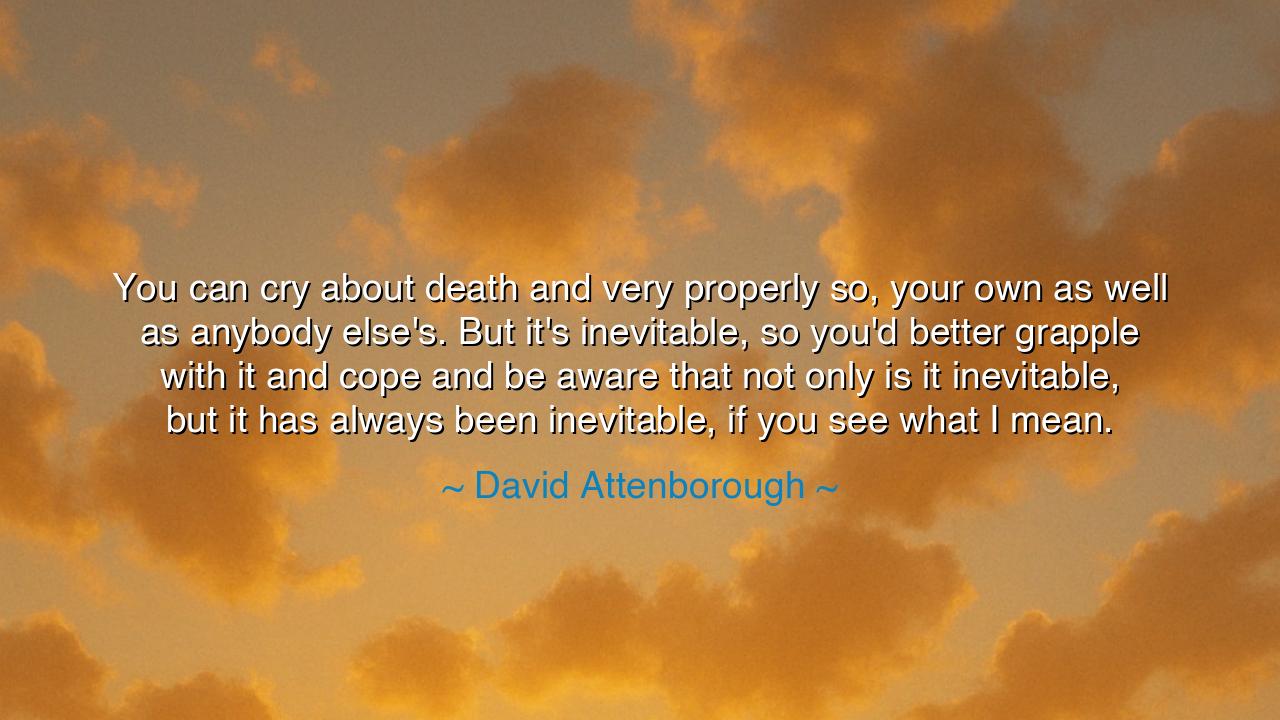
You can cry about death and very properly so, your own as well as
You can cry about death and very properly so, your own as well as anybody else's. But it's inevitable, so you'd better grapple with it and cope and be aware that not only is it inevitable, but it has always been inevitable, if you see what I mean.






“You can cry about death and very properly so, your own as well as anybody else's. But it's inevitable, so you'd better grapple with it and cope and be aware that not only is it inevitable, but it has always been inevitable, if you see what I mean.”
Thus spoke David Attenborough, the great naturalist and sage of the living world. In these words, spoken with the calm authority of one who has gazed deeply into the endless cycles of nature, he teaches not despair, but understanding. To him, death is not an intruder in the house of life, but one of its foundations. The tears we shed for it are honorable, for grief is the price of love—but beyond those tears must come acceptance, for death has always been and will always be. It is not the end of life’s story; it is the turning of its eternal page.
The origin of this reflection lies in the heart of Attenborough’s lifelong journey through the wilderness of creation. He has seen the birth of gazelles and the hunt of lions, the bloom of flowers and their withering, the rise and fall of whole species. In every corner of the earth, from coral reef to tundra, he has witnessed that death is woven into the pattern of life—a rhythm as ancient as time. His words are not the cold reasoning of the philosopher, but the warm wisdom of one who has lived among the truths of nature. He tells us that to deny death is to deny the very balance of existence.
From the first dawn of creation, every creature that has drawn breath has also walked toward its ending. The stars themselves die, collapsing into silence, only to give birth to new light. The ancient forests fall so that new growth may rise from their decay. Even our own bodies are built from the dust of long-dead stars and the bones of ancient beings. Thus, when Attenborough says death has “always been inevitable,” he speaks of a truth not only human, but cosmic. The wise understand that mortality is not tragedy—it is continuity, the unbroken flow of matter and spirit returning, transforming, renewing.
Consider the tale of Marcus Aurelius, emperor and philosopher of Rome. Amid the burdens of power, war, and loss, he wrote in his Meditations: “You could leave life right now. Let that determine what you do and say and think.” He, too, had learned to grapple with death, to face it as a companion rather than an enemy. Marcus knew that to fear death is to waste the life that remains; to accept it is to live with clarity and peace. Both he and Attenborough, though divided by centuries, speak with one voice: awareness of death is not despair—it is awakening.
To grapple with death, as Attenborough commands, is not to harden one’s heart, but to deepen it. It means to see death clearly—not as darkness to flee, but as a teacher. It teaches humility, for it reminds us that we are part of something larger. It teaches urgency, for it whispers that our time is short. It teaches gratitude, for every breath becomes sacred when we know it will end. And it teaches compassion, for knowing that all must die binds us to every living being with invisible threads of understanding.
And yet, he tells us, “you can cry”—for sorrow has its rightful place. The ancient Stoics said the wise man feels pain, but does not drown in it. So it is with Attenborough’s vision: grief is not weakness, but reverence for the bond between living souls. To weep for the dead is to honor life itself. But when the tears have fallen, one must rise again, aware that what has happened is not wrong, but inevitable, as constant as the tides that shape the shore.
So take this lesson, O child of the earth: do not turn from death, nor curse it. Look upon it as you would a sunset—sorrowful for its fading light, yet awed by its beauty. Cope, grapple, and understand. Remember that you walk in a long procession of the living and the dead, and that your passing will one day nourish others as theirs nourished you. Live with tenderness, for all things are fleeting. Love with depth, for love is what outlasts decay. And when the time comes to face the great stillness, meet it as Attenborough would: with open eyes, a steady heart, and the quiet understanding that death has always been inevitable—and therefore, nothing to fear.






AAdministratorAdministrator
Welcome, honored guests. Please leave a comment, we will respond soon